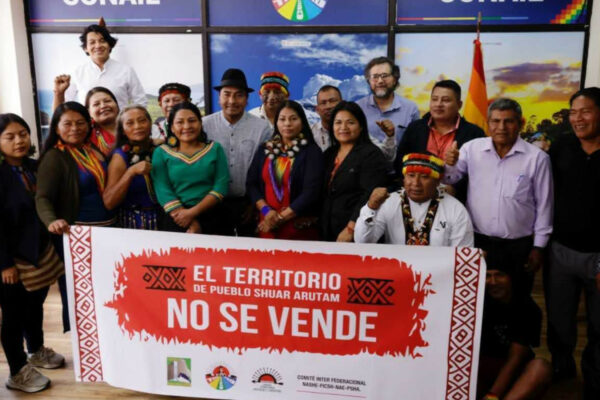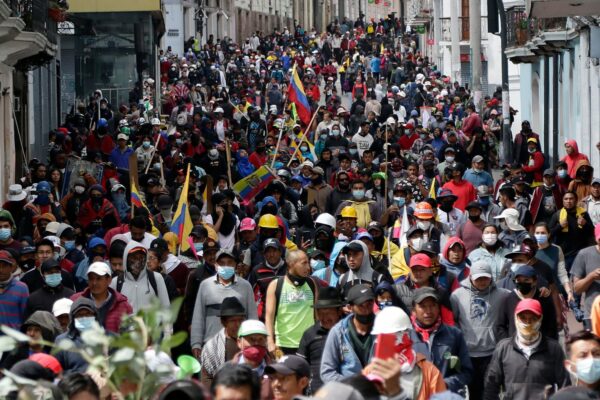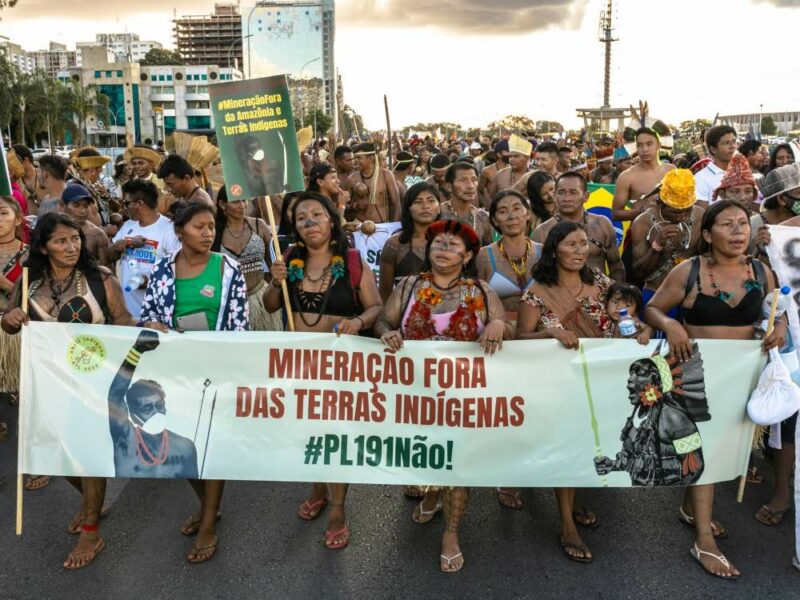Environmental, indigenous, and human rights organizations from across Brazil and around the globe have united in resistance against measures being adopted by the Brazilian government and the ruralista (agribusiness) lobby that violate human rights – especially those of indigenous and agricultural labourers – and jeopardize environmental protection. The group unveiled yesterday an open letter calling on other groups to join the cause; to date, over 100 organizations have signed on.
“Denounce and resist” is the motto unifying these groups into a coordinated resistance movement. With national-level and regional actions, the group will take action in the legislative, legal, and public spheres, sparing no effort to prevent the Temer government and the ruralistas from taking Brazil back decades in terms of environmental protection and human rights.
Attacks on human rights and the environment in Brazil are not new, but the weakening of human rights and environmental protection systems has expanded exponentially since the ascension of Michel Temer to the presidency and the corresponding centralization and concentration of power of the ruralistas took place. For the “denounce and resist” movement, Temer represents an enormous threat to indigenous rights and environmental protection.
The Temer administration has slashed funding for the Environment Ministry and began gutting the Indigenous Agency, FUNAI. His dictatorial views about dealing with indigenous issues is further evidenced by his having named a general to head FUNAI after sacking its previous director. The effects of such policies are evidenced in the rise on deforestation in 2016 after several years of decrease. 2016 also set two new macabre records. for deaths in rural areas and for land conflicts, patterns which have continued into 2017 with the gruesome attack on the Gamela indigenous community in Maranhão and the massacre of agriculture labourers in Colzina, Mato Grosso. The regions with the most conflicts are precisely those that border agribusiness, mining, power generation, and infrastructure works.
Situations such as these could be the tip of the iceberg. The provisional executive orders (EOs) 756 and 758, for example, reduce Amazon rainforest conservation areas, while EO 759 allows for the appropriation of public lands, abolishes the social use concept of land and eliminates land reform processes. Several indigenous land titling cases have been rejected by the Ministry of Justice and are now paralysed. Furthermore, the President’s Chief of Staff, Eliseu Padilha, who is under investigation in connection with the Lava Jato case and for land appropriation in Mato Grosso, is currently negotiating the reduction of existing conservation areas in the Amazon and promoting a bill that would essentially eliminate environmental licensing.
The approval of these measures, proposed by the ruralistas, would result in greater land concentration, the economic infeasibility of small-scale agricultural production, increased land grabbing of public lands, and the commodification of rural settlements and agrarian reform. They would also prevent Brazil from complying with its commitments to the United Nations Framework Convention on Climate Change.
“The very survival of Brazil’s indigenous peoples is imperiled by the actions taken or planned by the Temer administration,” said Christian Poirier, Amazon Watch Program Director. “The consequences of these attacks on human rights and environmental protections are dire: denying indigenous land rights will jeopardize the Amazon’s live-giving ecosystems and, by extension, our collective future. Only the determined efforts of Brazil’s indigenous movement and its allies to counter the ruralista onslaught will ensure native land rights and defend the rainforest.”
Many of these proposals, when previously introduced, were halted by lack of popular support or constitutional violations, but now such measures find in the ruralista lobby, which dominates Congress and the Temer Administration, sufficient support to skate through the legislative process at a record speed via provisional measures, decrees and fast track votes. Not even rights guaranteed by the Constitution are safe.
The measures of primary concern are:
- Weakening of environmental licensing (PL 3.729/2004 – general licensing law)
- Annulment of Indigenous rights and lands (PEC 215/2000 would dispense with indigenous territory titling , and PEC 132/2015 would provide buyout packages for indigenous lands)
- Greater access for foreign investors to purchase land ( PL 2289/2007 – PL 4059/2012)
- Reduction of conservation areas (MP 756/2016, and MP 758/2016 would specifically reduce conservation areas in the Amazon rainforest of Pará state)
- Weakening of agro-toxins regulations (PL 6299/2002 reduces regulations on pesticides, and PL 34/2015 reduces regulations on GMOs)
- Facilitation of land grabbing, occupation of public lands of high environmental value and the end of the concept of social function of the land (MP 759/2016)
- Attacks to the rights of agricultural workers (PL 6422/2016 would change rules on agricultural work, PEC 287/2016 would reduce worker protections, PLS 432/2013 would change the definition of slave labor)
- Attacks to the rights of riverine and quilombo – originated from escaped slaves – communities (MP 759/2016, PL 3.729/2004)
- Flexibilization of mining rules (PL 37/2011 would change the Mining Code)
Organizations that have joined the resistance so far:
- 350.org
- Abraço Guarapiranga
- ABRAMPA/Associação Brasileira dos Membros do Ministério Público de Meio Ambiente
- ABECO/Associação Brasileira de Ciência Ecológica e Conservação
- ABONG/Associação Brasileira de Organizações Não Governamentais
- Actionaid
- AdT/Amigos da Terra
- AFES/Ação Franciscana de Ecologia e Solidariedade
- Aldeia Guarani Kalipty – Parelheiros
- Aldeia Guarani Tenondé Porã – Parelheiros
- AMA/ Associação Comunitária Amigos do Meio Ambiente para a Ecologia, o Desenvolvimento e o Turismo Sustentáveis de Garopaba-SC
- AMAR/Associação de Defesa do Meio Ambiente de Araucária
- Amazônia Real
- Amazon Watch
- ANA/Articulação Nacional de Agroecologia
- ANDI/Agência de Notícias dos Direitos da Infância
- ANSEF/Associação Nacional dos Servidores da FUNAI
- APIB/Articulação dos Povos Indígenas do Brasil
- APROMAC/Associação de Proteção ao Meio Ambiente
- APREMAVI/Associação de Preservação do Meio Ambiente e da Vida
- Articulação para o Monitoramento dos Direitos Humanos no Brasil
- Associação Coletivista Dom Helder Câmara
- Associação Bem-Te-Vi Diversidade
- Associação Mico-Leão-Dourado
- AWIRE/Aliança Multiétnica de Permacultura
- BVRio
- BJHRF/Bianca Jagger Human Rights Foundation
- Bicuda Ecológica
- Cáritas Nacional
- CASA Brasil/Conselho de Assentamentos Humanos Sustentáveis
- Casa Ecoativa – Ilha do Bororé
- Casa Fluminense
- CBJP/Comissão Brasileira Justiça e Paz
- CEBES/Centro Brasileiro de Estudos de Saúde
- CEBI/Centro de Estudos Bíblicos
- CEDENPA/Centro de Estudos e Defesa do negro do Pará
- CECVI/Centro de Educação e Cultura Vale do Iguape
- CDDHEP/Centro de Defesa dos Direitos Humanos e Educação Popular do Acre
- CI/Conservação Internacional
- CIMI/Conselho Indigenista Missionário
- Comissão Dominicana de Justiça e Paz do Brasil
- Comitê Nacional em Defesa dos Territórios Frente à Mineração
- Comissão Pró-Índio de São Paulo
- CONAQ/Coordenação Nacional de Articulação das Comunidades Negras Rurais Quilombolas
- Conectas Direitos Humanos
- Conselho Quilombola da Bacia e Vale do Iguape
- CONTAG/Confederação Nacional dos Trabalhadores Rurais Agricultores e Agricultoras Familiares
- Coração Amazônico
- Cooperapas/Cooperativa Agroecológica dos Produtores Rurais de Água Limpa -SP
- Clímax Brasil
- CNS/Conselho Nacional das Populações Extrativistas
- Consulta Popular
- CPT/Comissão Pastoral da Terra
- CUT/Central Única dos Trabalhadores
- EarthCode Project
- Engajamundo
- Escola de Ativismo
- Espaço de Formação Assessoria e Documentação
- FAOR/Fórum da Amazônia Oriental
- FASE/Federação de Órgãos para Assistência Social e Educacional
- Fundação Luterana de Diaconia
- Fórum Mudanças Climáticas e Justiça Social
- FURPA/Fundação Rio Parnaíba
- Gambá/Grupo Ambientalista da Bahia
- Greenpeace Brasil
- Grupo Carta de Belém
- Grupo de trabalho de atendimento a comunidades indígenas da Defensoria Pública da União/GT Indígenas DPU
- IBASE/Instituto Brasileiro de Análises Sociais e Econômicas
- ICV/Instituto Centro de Vida
- IDESAM/Instituto de Conservação e Desenvolvimento Sustentável do Amazonas
- IDS/Instituto Democracia e Sustentabilidade
- IEMA/Instituto de Energia e Meio Ambiente
- IEPE – Instituto de Pesquisa e Formação Indígena
- Iniciativa Verde
- Instituto Hórus de Desenvolvimento e Conservação Ambiental
- Intersindical – Central da Classe Trabalhadora
- IMAFLORA/Instituto de Manejo e Certificação Florestal e Agrícola
- Imargem – Arte, Meio Ambiente e Convivência
- IMAZON/ Instituto do Homem e Meio Ambiente da Amazônia
- INESC/ Instituto de Estudos Socioeconômicos
- International Rivers Brasil
- Instituto Avaliação
- Instituto Ethos
- Instituto Pólis
- Instituto Hórus de Desenvolvimento e Conservação Ambiental
- IPAM/Instituto de Pesquisa Ambiental da Amazônia
- IPESA/Instituto de Projetos e Pesquisas Socioambientais
- ISA/Instituto Socioambiental
- Justiça Global
- Justiça nos Trilhos
- Liga Brasileira de Lésbicas
- Mater Natura – Instituto de Estudos Ambientais
- MAB/Movimento dos Atingidos por Barragens
- MAM/Movimento pela Soberania Popular na Mineração
- MCP/Movimento Camponês Popular
- Marcha Mundial do Clima/SOS Clima Terra
- MMC/Movimento de Mulheres Camponesas
- Mogave/Movimento Garça Vermelha
- MNCCD/Movimento Nacional Contra Corrupção e pela Democracia
- Movimento Contra o Aeroporto de Parelheiros
- Movimento Aeroporto de Parelheiros NÃO!
- Movimento pela Moralidade Pública e Cidadania
- Movimento Social Via do Trabalho – Bahia
- MPA/Movimento dos Pequenos Agricultores
- MST/ Movimento dos Trabalhadores Rurais Sem Terra
- MTST/Movimento dos Trabalhadores Sem Teto
- MUDA-SP/Movimento Urbano de Agroecologia de São Paulo
- Núcleo de Estudos das Diversidades, Intolerâncias e Conflitos – Diversitas/USP
- Núcleo de Pesquisa e Extensão em Ambiente, Socioeconomia e Agroecologia/NUPEAS-UFAM
- Observatório do Clima
- Observatório de Favelas, da favela da Maré, Rio de Janeiro
- OCCA/Observatório dos Conflitos do Campo – Universidade Federal do Espírito Santo (UFES)
- ONG Coração Amazônico
- Organon/Núcleo de estudo, pesquisa e extensão em mobilizações sociais da UFES
- Oxfam Brasil
- PAD/Processo de Articulação e Diálogo entre Agências Ecumênicas Européias e Parceiros Brasileiro
- Parque das Aves – Foz do Iguaçu
- PHS/Hospitais Saudáveis
- PFDC/Procuradoria Federal dos Direitos do Cidadão do MPF/Ministério Público Federal
- PJR/Pastoral da Juventude Rural
- Plataforma Operária e Camponesa para Energia
- Projeto Volume Vivo
- Polo de Unidade Camponesa – Bahia
- PPBioMA/Rede de Pesquisa em Biodiversidade Mata Atlântica
- RAMH/Rede Acreana de Mulheres e Homens
- RBMA/Conselho Nacional Reserva da Biosfera da Mata Atlântica
- RCA/Rede de Cooperação Amazônica
- Rede Brasileira de Informação Ambiental
- Rede GTA/Grupo de Trabalho Amazônico
- Rede Novos Parques
- Rede ODS Brasil
- Rede PPBio Mata Atlântica
- SAVE Brasil
- Sinfrajupe/Serviço InterFranciscano de Justiça, Paz e Ecologia
- SBE/Sociedade Brasileira de Espeleologia
- Slow Food Brasil
- SNE/Sociedade Nordestina de Ecologia
- SOS Mata Atlântica
- Terra de Direitos
- TETO Brasil
- Toxisphera Associação de Saúde Ambiental
- UBM/União Brasileira de Mulheres
- Uma Gota no Oceano
- UNALGBT/União Nacional de Lésbicas, Gays, Bissexuais, Travestis e Transexuais
- Via Campesina
- WWF Brasil













